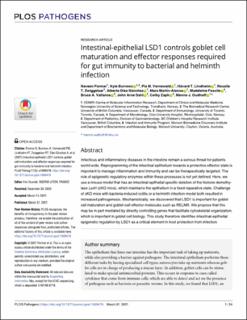Intestinal-epithelial LSD1 controls goblet cell maturation and effector responses required for gut immunity to bacterial and helminth infection
Parmar, Naveen; Burrows, Kyle; Vornewald, Pia M.; Lindholm, Håvard T.; Zwiggelaar, Rosalie T.; Díez-Sánchez, Alberto; Martín-Alonso, Mara; Fosslie, Madeleine; Vallance, Bruce A.; Dahl, John Arne; Zaph, Colby; Oudhoff, Menno J.
Peer reviewed, Journal article
Published version

Åpne
Permanent lenke
https://hdl.handle.net/11250/2784131Utgivelsesdato
2021Metadata
Vis full innførselSamlinger
Sammendrag
Infectious and inflammatory diseases in the intestine remain a serious threat for patients world-wide. Reprogramming of the intestinal epithelium towards a protective effector state is important to manage inflammation and immunity and can be therapeutically targeted. The role of epigenetic regulatory enzymes within these processes is not yet defined. Here, we use a mouse model that has an intestinal-epithelial specific deletion of the histone demethylase Lsd1 (cKO mice), which maintains the epithelium in a fixed reparative state. Challenge of cKO mice with bacteria-induced colitis or a helminth infection model both resulted in increased pathogenesis. Mechanistically, we discovered that LSD1 is important for goblet cell maturation and goblet-cell effector molecules such as RELMß. We propose that this may be in part mediated by directly controlling genes that facilitate cytoskeletal organization, which is important in goblet cell biology. This study therefore identifies intestinal-epithelial epigenetic regulation by LSD1 as a critical element in host protection from infection.
